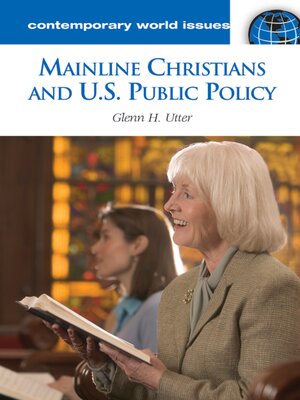Mainline Christians and U.S. Public Policy
ebook ∣ A Reference Handbook · Contemporary World Issues
By Glenn H. Utter

Sign up to save your library
With an OverDrive account, you can save your favorite libraries for at-a-glance information about availability. Find out more about OverDrive accounts.
Find this title in Libby, the library reading app by OverDrive.



Search for a digital library with this title
Title found at these libraries:
| Library Name | Distance |
|---|---|
| Loading... |
This insightful reference work explores the relationship between mainline Christian denominations and U.S. politics and public policy, from colonial times to the present.
Mainline Christian Values and U.S. Public Policy: A Reference Handbook provides a revealing and unbiased look at the emergence of Christian denominations as a political force, primarily from the late 19th century to the present.
The book examines the origins, development, current organization and activities, and future prospects of nine mainline U.S. denominations: the American Baptist Churches in the U.S.A., the Catholic Church, the Christian Church, the Episcopal Church, the Evangelical Lutheran Church in America, the Presbyterian Church, the Reformed Church in America, the United Church of Christ, and the United Methodist Church. Readers will encounter a surprising variety of Christian voices offering a range of positions on the Iraq War, abortion, same-sex marriage, global warming, stem-cell research, the death penalty, and other controversial issues.
Mainline Christian Values and U.S. Public Policy: A Reference Handbook provides a revealing and unbiased look at the emergence of Christian denominations as a political force, primarily from the late 19th century to the present.
The book examines the origins, development, current organization and activities, and future prospects of nine mainline U.S. denominations: the American Baptist Churches in the U.S.A., the Catholic Church, the Christian Church, the Episcopal Church, the Evangelical Lutheran Church in America, the Presbyterian Church, the Reformed Church in America, the United Church of Christ, and the United Methodist Church. Readers will encounter a surprising variety of Christian voices offering a range of positions on the Iraq War, abortion, same-sex marriage, global warming, stem-cell research, the death penalty, and other controversial issues.






